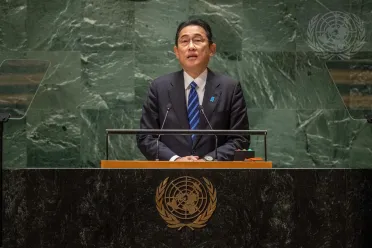Statement
Statement summary
FUMIO KISHIDA, Prime Minister of Japan, urged the international community to renew cooperation to protect and strengthen human dignity as a driving force across the world. Hailing from Hiroshima, he has made nuclear disarmament his “lifelong mission” and called on leaders of nuclear-weapon States to step up progress towards a world without nuclear weapons. As it is “paramount to transcend purely government efforts and engage in multi-layered efforts,” he said Japan will contribute 3 billion yen to establish a new “Japan Chair for a world without nuclear weapons” at overseas research institutes to overcome the divisive debate between academia and Government on choosing deterrence or disarmament. Japan seeks to normalize its relationship with the Democratic People’s Republic of Korea by comprehensively resolving outstanding issues, including abductions, nuclear and missile issues, and settling “our unfortunate past”. To open up a new era together, he conveyed his determination to meet with President Kim Jong-Un face-to-face at any time and without any conditions, with an interest in holding high-level talks under his direct supervision “to realize a summit meeting at an early time.”
Underscoring the world’s status at a “historical inflection point,” he reflected on the origins of the United Nations and reiterated the importance of the rule of law and Japan’s interest in protecting the right of vulnerable nations and peoples to live in peace. In particular, the Russian Federation’s infringement on international law must be rectified as soon as possible and the nuclear threat must be ended. Regarding the Security Council, he expressed Japan’s support to increase African representation and expand both permanent and non-permanent membership. Moreover, Japan will continue efforts to increase the transparency of Council discussions, including by improving access to deliberations. Regarding peacekeeping, his Government will further extend aid, including by contributing an additional $9 million to support capacity-building for personnel deployed in African Union peace support operations. He also reiterated Japan’s new plan for a free and open Indo-Pacific where diverse nations coexist and prosper together, based on principles of the rule of law and inclusiveness.
On climate, he stated that Japan will further support disaster risk reduction for countries vulnerable to climate change, including island States. Before net zero is achieved, Japan will also work to mitigate potential impacts from rising sea levels and extreme weather events. Additionally, he urged the international community to prepare for the next infectious disease outbreak. In line with public and private sector pledges at the Group of Seven to achieve universal health coverage and strengthen prevention, preparedness, and response to health crises, Japan will contribute $7.5 billion from 2022 to 2025. Japan will also continue to work with developing countries to ensure equitable access to medical countermeasures for health emergencies.
On the emerging issue of technology, he noted the need to balance the “progress of digitalization” with human dignity. While digital technology is bringing benefits to everybody, there are also risks of violating privacy and human rights. Japan launched the Hiroshima Artificial Intelligence (AI) Process on Generative AI, in order to advance more trustworthy AI and build a digital ecosystem with international rules compatible with human dignity. Overall, in the face of an increasingly divided international community experiencing multiple crises, he called for a common language that resonates with everyone. “We should go back to the very basic foundation of treating human life and dignity with paramount importance.” By focusing on human dignity, the international community can steadily advance “human-centred” cooperation.
The Prime Minister of Japan said on Tuesday that he is open to meeting President Kim Jong-Un of the Democratic People’s Republic of Korea (DPRK) at any time and without any conditions “to open up a new era together” between the countries.
Full statement
Read the full statement, in PDF format.
Photo

Previous sessions
Access the statements from previous sessions.
